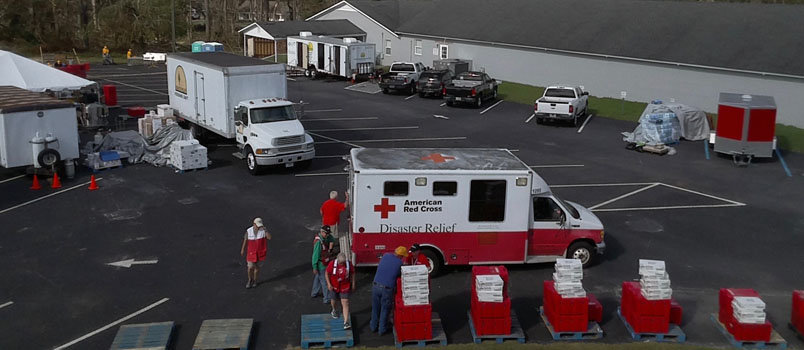 In this drone photography, Red Cross units, foreground, prepare to receive hot meals in red containers from the Georgia Baptist kitchen, background. A similar scenario was playing out on the other side of the parking lot where a kitchen was servicing The Salvation Army. BOB SPRINKEL/Special
In this drone photography, Red Cross units, foreground, prepare to receive hot meals in red containers from the Georgia Baptist kitchen, background. A similar scenario was playing out on the other side of the parking lot where a kitchen was servicing The Salvation Army. BOB SPRINKEL/SpecialBAINBRIDGE — As a long awaited cool spell filtered into the normally balmy southwestern corner of GA on Sunday morning, disaster relief feeding units breathed a sigh of relief.
The noticeable nip in the air made the work of the volunteers considerably easier as they worked around hot burners to prepare the only hot meals many residents would have for the day. By 8:30 a.m. the volunteers were well into preparing thousands of hot meals for victims who survived the Oct. 10 onslaught of Hurricane Michael.
In some ways it was just another disaster, another opportunity to provide a witness in the name of Christ. While some Georgia Baptists served in the field kitchens, others moved from downed tree to downed tree on cleanup and recovery teams.
The sound of chainsaws filled the air wherever they went.
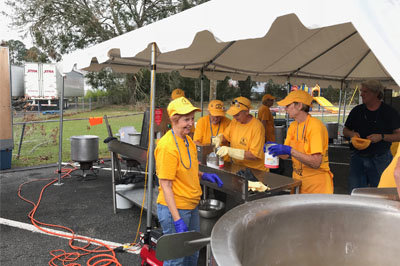 Unit 11F members start early in the day to prepare 6,000 meals by the end of their daily shift. BOB SPRINKEL/Special
Unit 11F members start early in the day to prepare 6,000 meals by the end of their daily shift. BOB SPRINKEL/SpecialBut there was an historical element to this single location. For possibly the first time ever the kitchens were providing food to both The Salvation Army on one side and the Red Cross on their other.
“It’s an interesting scene, ministering with a faith-based group and a secular group but they are working together extremely well. It’s a model of cooperation,” said Bob Sprinkel from Hinesville. Sprinkel, as a White Hat, supervises multiple units and coordinates the work for a specific location. He has been serving with the ministry “just shy of 20 years,” and drove the 4.5 hours from the Savannah area to provide weekend relief during a rotation of volunteers. After 48 long hours he was back home by Sunday at midnight.
By early yesterday morning when most Georgia Baptists were heading for Sunday School, one kitchen was halfway through preparing the day’s 6,000 hot lunches and dinners for the Red Cross and the other halfway through preparing the day’s 2,500 for The Salvation Army. When both lunch and dinner were totaled, about 8,500 meals― a typical day’s work ― had been prepared.
Over the team’s nine days that adds up to 76,500 meals.
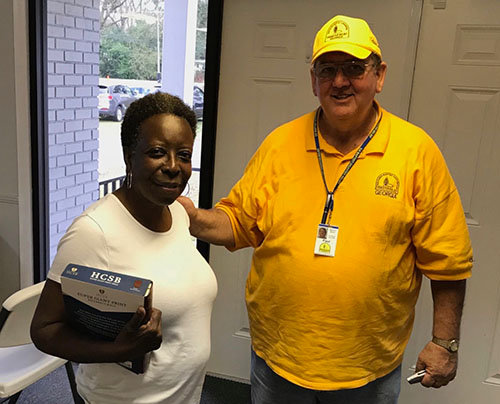 Chaplain Paul Moore visits with a woman after she appeared asking for a Bible "really, really bad." BOB SPRINKEL/Special
Chaplain Paul Moore visits with a woman after she appeared asking for a Bible "really, really bad." BOB SPRINKEL/SpecialThe meals are not just hot dogs and hamburgers, though they do show up on occasion. Sprinkel said the kitchens serve a lot of boneless chicken breasts in a variety of ways … such as barbecue and chicken fingers. Other options include roast beef, burritos, and ravioli.
“Disaster food needs to be easy to prepare but offer variety and be of top quality,” he stresses.
The two kitchen teams, who have been onsite for 8 days, are set up in the parking lot of Morningside Baptist Church. One kitchen services the needs of The Salvation Army from its USFoods vendor while the other services the Red Cross from its SYSCO vendor.
Georgia Baptists work with both groups on a regular ministry basis, but this is the first time both operated out of the same location.
Each non-profit purchases food through donations and fundraising efforts, then negotiates prices and menu options with various vendors. The vendors then deliver the items directly to the Disaster Relief kitchens, usually set up on church parking lots, which prepare the food.
The Georgia Baptist volunteers prepare the meals, which are then plated in large Cambros containers which keep the contents to at least 150 degrees. The Salvation Army and Red Cross then plate the meals in clamshell boxes similar to the “take out” boxes used by restaurants.
Each of the two entities has its own designated area to provide residents with the meals. The Salvation Army is distributing their meals locally around Decatur County while the Red Cross is serving counties in the southwest corner of the state that were hardest hit. Most of those residents remain without power or water and depend on the hot sustenance.
The field kitchens do not serve meals to residents who show up at the preparation area, Sprinkel explains. That would be too distracting from the clockwork-like timetable that volunteers have to abide by to keep on schedule. Those who do show up are directed to the feeding locations.
However, on this day Sprinkel had a supply of 300 MREs … Meals Ready to Eat used by the military … that were being given away on a first-come, first-served basis. Bottles from several pallets of life-saving water were free for the taking by anyone who asked.
Sprinkel was proud to relate that the kitchens are inspected every day by the health department, unlike the less frequent schedule used to visit restaurants.
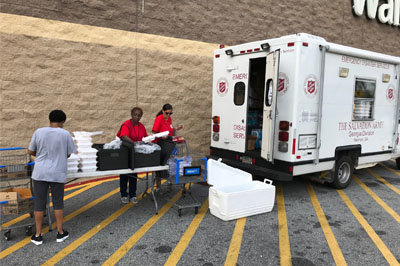 The Salvation Army distributes hot meals prepared by Georgia Baptist Disaster Relief kitchen crews at a Bainbridge Walmart. BOB SPRINKEL/Special
The Salvation Army distributes hot meals prepared by Georgia Baptist Disaster Relief kitchen crews at a Bainbridge Walmart. BOB SPRINKEL/Special“They cut us no slack and we pass every inspection with no questions asked. I’d put our crews up against anyone in the restaurant industry,” he adds.
Chaplains provide spiritual assistance, and one woman showed up on Saturday saying all she needed was a Bible “really, really bad.” Chaplain Paul Moore counseled and gave her one of the few of the original 50 Bibles that remained.
While hot meals are important, Sprinkel states that what disaster ministry is all about is the opportunity to share Christ through suffering.
“We had 3 salvations yesterday at a cleanup and recovery site where the chainsaw crews were working. A chaplain related that two of those were females who were just out walking and observing the damage. They were approached by the chaplains and began a conversation,” Sprinkel recounted.
“The girls kept asking questions and then the conversation was directed to the most important question they would ever be asked ― where would they be if they died today. Would they be in heaven or hell?”
That’s when the conversation turned serious.
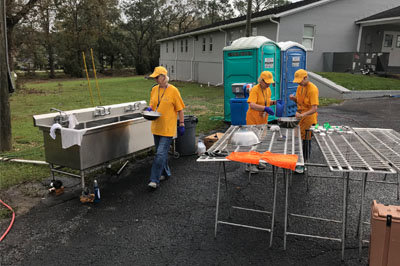 Members of the informally known 'kitchen police,' a military term, wash and sterilize kitchen items. BOB SPRINKEL/Special
Members of the informally known 'kitchen police,' a military term, wash and sterilize kitchen items. BOB SPRINKEL/Special“The girls thought for a minute and then were suddenly caught like deers in the headlights. ‘I don’t want to go to hell, I want to go to heaven,’ they both agreed. ’What do we do now?’”
The chaplain was more than happy to share the plan of salvation with them. And it happened again on Sunday when chaplains led 10 individuals to faith in Christ by the end of the day. Nine of those were by Chaplain David Miller, and three of those were in one family using the new Disaster Relief evangelism tract.
“The purpose of Disaster Relief is not to take a tree off of a house or serve a hot meal or take care of a child. It’s to serve Christ in crisis by demonstrating the love of Christ as we do those things.
“That’s what it’s all about and why we are here,” Sprinkel said as he pulled out of town in his car Sunday night.
And it’s why he is about to begin his third decade of ministry as a Disaster Relief volunteer.